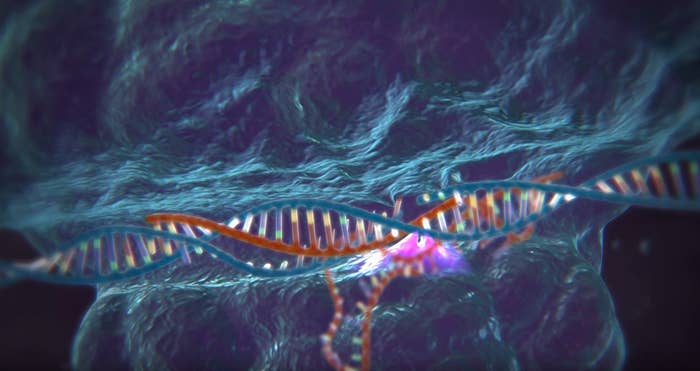
A biotech startup has been issued a patent that involves CRISPR, the breakthrough gene-editing method that has sparked a nearly unprecedented intellectual property feud between some of the country's biggest institutions. But it's unclear what effect, if any, the patent will have on that fight.
The patent issued Tuesday went to Caribou Biosciences in Berkeley, which was co-founded by Jennifer Doudna. The University of California, Berkeley, scientist has said that she, along with French microbiologist Emmanuelle Charpentier, invented CRISPR — a claim disputed by rival researcher Feng Zhang of the Broad Institute and the Massachusetts Institute of Technology. Zhang's CRISPR patents were issued first and are licensed to the newly public therapeutics company Editas Medicine, among others.

The CRISPR patents of Zhang's in dispute involve Cas9, the name of a protein that, in short, makes CRISPR work. But Caribou's new patent — which patent experts on all sides are still puzzling over — seems to describe ways of making the technology work with proteins other than Cas9.
In plain English, Caribou at first glance seems to be staking out a much wider range of CRISPR uses, Jacob Sherkow, an associate law professor who specializes in biotechnology and intellectual property at New York Law School, told BuzzFeed News.
Which means the patent dispute may "not be an end-all be-all," Sherkow said. "Even if Doudna loses, they're still going to have patents like these or this one out there. They may be able to use these to block Zhang and Editas from using some techniques, it's possible."
Put another way: "It's significant — and the meaning of it is still unclear."
Dan Burk, a law professor at University of California, Irvine School of Law, said that the patent appears to cover a set of very specific methods of editing with CRISPR. It is lengthy and detailed, which means that its claims are narrow, but Burk said it could still be significant someday — depending on how many methods of CRISPR-editing there turn out to be overall, and how effective they are. “Any new technology is going to have multiple inventions associated with it,” he said, giving the example of a car being a technology with “dozens or hundreds” of patents associated with its parts and functions.
“If you can find substitutes that aren’t covered by this patent, the patent turns out to not be very powerful or useful,” Burk said. “But if this is the best way or the only way, it could be quite important.”
Some observers have questioned if the patent even covers gene-editing in the first place, noting that the patent’s claims begin “A method for detecting if two complexes are in proximity to one another…”.
But someday in a patent dispute, an attorney may well declare “detecting” to be a crucial first aspect of gene-editing, Burk said. “You might say, ‘The part of the editing process that I have discovered that’s new and patentable is the step of detecting. And if you can’t do the rest without doing that, this could be very important and I get to control this.'"
He added that this could be the beginning of other CRISPR-related patent fights.
"I'd expect anybody working in the field, if they discover an improvement or something that hasn't been seen or done before, to get patents, so we’re going to see dozens, maybe hundreds, associated with this technology, and they may or may not overlap," he said.
Caribou filed this patent, titled "Compositions and methods of nucleic acid-targeting nucleic acids," in March 2014. Meanwhile, Doudna and Charpentier's original CRISPR patent application from May 2012 — the application that has triggered the now ongoing dispute yet to be resolved by the U.S. Patent and Trademark Office — is still pending.
Andy May, Caribou's chief scientific officer, noted that the company was the first founded to find commercial uses for CRISPR. CRISPR systems, he told BuzzFeed News, "can have impacts in many different areas from therapeutics to plant breeding to animal breeding to the generation of chemicals, using bacteria and yeast."
Spokespeople for the Broad Institute and UC Berkeley did not immediately respond to BuzzFeed News requests for comment.
This video from the Broad Institute explains how CRISPR works:
View this video on YouTube
UPDATE
This story has been updated to include a statement from Caribou Biosciences' Chief Scientific Officer Andy May.
UPDATE
This story has been updated to include commentary from law professor Dan Burk.
UPDATE
This story has been updated to include remarks from an interview with Caribou's Andy May.

